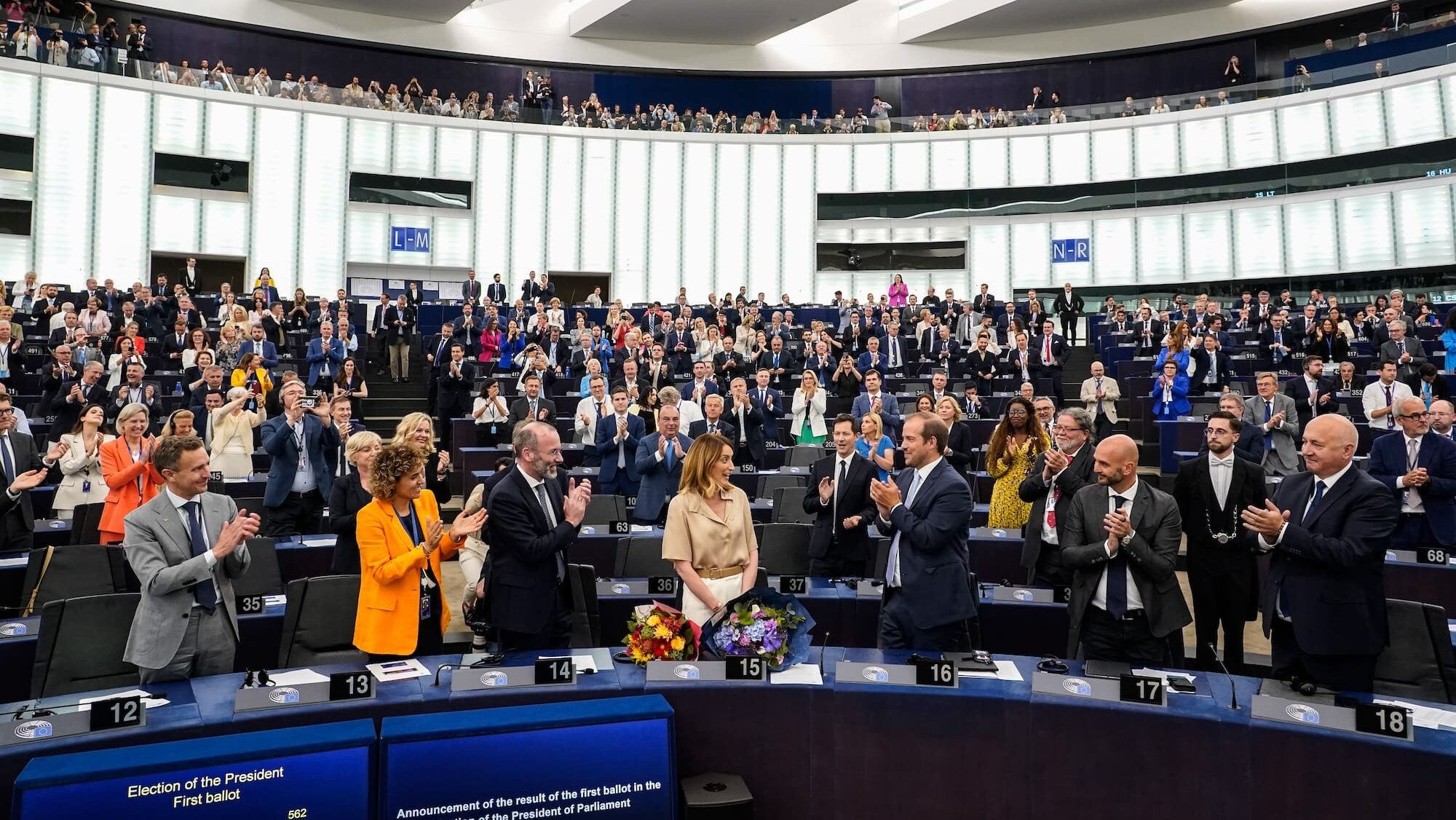
EU Parliament President Roberta Metsola being congratulated by colleagues for her re-election in Strasbourg, July 16th.
Photo: Philippe Buissin © European Union – Source: EP
The first plenary session of the new European Parliament (EP) was held in Strasbourg on Tuesday, July 16th, at which it elected its President and 14 Vice Presidents, collectively termed the ‘Bureau.’ Normally, the internal rules would allocate at least one vice presidency to every parliamentary group. This time, however, the EP’s third-largest bloc, the Patriots for Europe (PfE), was denied a seat in the Bureau, along with the Europe of Sovereign Nations (ESN) group.
Surprising no one, Roberta Metsola from the centrist European People’s Party (EPP) was re-elected by a wide margin as President of the European Parliament. The Maltese MEP received 562 votes in the 720-seat chamber. Spain’s Irene Montero, the lone ‘token’ opposition candidate hailing from the extreme left received 61 votes, less than the number of blank or invalid ballots (76) that MEPs cast—most probably in protest at having only these two choices.
The real question, of course, was about the distribution of the vice presidencies. The composition of the Bureau is important, as the body is responsible for all matters relating to the budget, administration, and organization of the Parliament and its staff. As such, it has the power to amplify or abate the political influence of groups or parties if it wishes to.
Through two rounds of voting, the majority granted three vice presidencies to the EPP; five to the social democrat S&D to counterbalance Metsola’s seat; two to the liberal Renew as well as Giorgia Meloni’s European Conservative and Reformists (ECR); and one each to the Greens and the far-left The Left groups. The candidates of the two remaining right-wing groups, Viktor Orbán’s PfE and the AfD-led ESN, were voted down.
This means that out of the 15 decision-making members of the EP’s Bureau, only two belong to right-of-center parties,—despite those parties representing over a quarter of European voters—while nine seats are held by leftists. There are also five Quaestors who oversee financial matters and sit in the Bureau in a consultative capacity only, and their distribution follows the same pattern. Two were given to EPP, and one each to S&D, Renew, and ECR.
“Shame on this European Parliament, especially the EPP group, who once again ignored the will of millions of European voters, who voted for change,” the Patriots’ First Vice-President, MEP Kinga Gál (Fidesz) wrote on X shortly after the vote, slamming the election of the “communist” Younous Omarjee—from the far-left France Unbowed (LFI) party instead of the PfE candidate—as deeply undemocratic.
❗️Shame on this @Europarl_EN , especially the @EPPGroup, who once again ignored the will of millions of European voters, who voted for change. Instead of respecting democracy and parliamentary customs by electing a VP the #PatriotsforEurope group nominated, they enabled a…
— Kinga Gál (@kingagalMEP) July 16, 2024
While the outcome does indeed go against democratic principles, it’s also legal under the current system. The Parliament’s internal rules do not automatically give a seat in the Bureau to every group, but merely suggest that MEPs take into account “the need to ensure an overall fair representation of political views” and that the outcome “broadly reflects the size of the groups.”
This wording is vague for a reason, allowing the majority to prevent extremists from taking positions of power if they can carry the vote. This practice is known as ‘cordon sanitaire.’
While the principle is debatable in its own terms, its main problem is that Brussels is applying the cordon sanitaire in a consistently partisan manner: only against the Right, never against the Left. If the ESN is to be excluded from the Bureau (as well as from chairing parliamentary committees), so should The Left. And even then, there’s no excuse for excluding the Patriots, given that they have a stronger democratic mandate than every other group except EPP and S&D.
Yet, that’s exactly what’s happening. Completely disregarding the democratic outcome of the elections, the leftist groups—especially the Greens and the Socialists—have been calling for a hard cordon sanitaire against the Patriots since the group’s inception. “The Orbán faction must be isolated in the European Parliament,” said MEP Katarina Barley recently, a leader of the German socialists’ EP delegation.
In response, Tom Vandendriessche of the Flemish Vlaams Belang warned that such blatant hypocrisy would only serve to “delegitimize” the entire institution. “The Parliament belongs to the people that elected its representatives, it does not belong to the majority,” the MEP said. He added that excluding the third-largest group would make the Parliament “lose all sense of credibility when lecturing others about European values and respect for democracy and the rule of law.”
Still, this cordon sanitaire will likely remain in place for the next five years, affecting every policy initiative coming from the right. As a notable first example on Wednesday, the majority rejected a proposal from PfE to hold a political debate about the assassination attempt on President Trump as well as issue a resolution to condemn political violence. All groups, except national conservatives, voted against both proposals.
